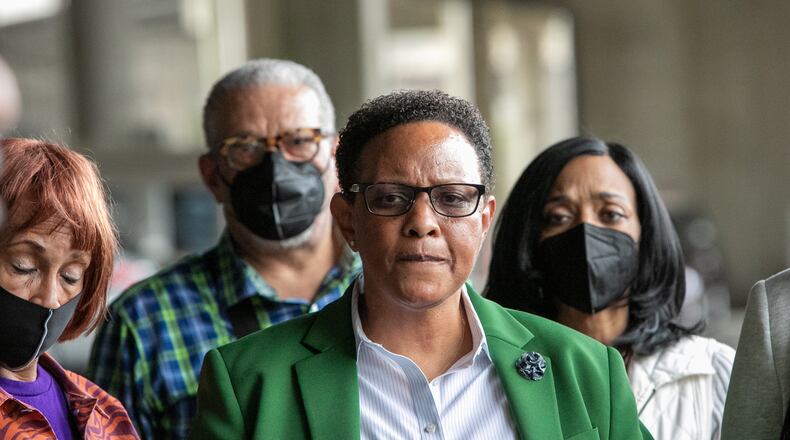Attorneys for former city of Atlanta official Mitzi Bickers, who was convicted two years ago in a City Hall cash-for-contracts scheme, on Tuesday pushed for a new trial during oral arguments at the 11th Circuit Court of Appeals.
At issue is whether U.S. District Court Judge Steve C. Jones erred in not allowing the defense to introduce evidence alleging that contractor Elvin “E.R.” Mitchell Jr., who was a principal witness in the case against Bickers, was working as an FBI informant whose job was to bribe officials at the time he was accused of conspiring with Bickers.
A jury of six men and six women found Bickers guilty in March 2022 on nine of 12 felony counts against her in connection to the scandal. She was sentenced to 14
years in prison — by far the longest term for any of the 10 people jailed in the sprawling, years-long investigation. The convictions included conspiracy to commit bribery, money laundering, filing false tax returns and wire fraud.
Prosecutors dropped four wire fraud charges after courts of appeal — including the U.S. Supreme Court — redefined conditions under which fraud accusations could be prosecuted.
Bickers worked as Atlanta’s Human Services Director in Mayor Kasim Reed’s administration, and was a get-out-the-vote guru whose operation was largely credited with helping elect Reed to his first term in the mayor’s office.
Prosecutors say Bickers received about $2 million in exchange for steering some $17 million in contracts to Mitchell and fellow contractor Charles P. Richards, Jr.
Bickers’ attorneys argued to the three appeals court judges that they believed Mitchell worked as an FBI informant until 2012, two years after Bickers is accused of steering city sidewalk, bridge work and snow removal contracts to Mitchell and Richards. Keeping that information from the jury hurt the defense team’s ability to defend Bickers, the attorneys said.
Richards pleaded guilty in 2017 to conspiracy to commit bribery in connection with the scheme.
“It not only impugns (Mitchell’s) credibility, but the government’s case,” attorney Marissa Goldberg said in calling for a new trial.
Jones allowed Bickers’ team to question Mitchell about his cooperation with the FBI, how long he was an informant, whether he wore a wire and if he had his phones wiretapped. But the judge prohibited the defense from introducing the idea that Mitchell worked as a paid informant, because it wasn’t clear there was evidence he was on the government’s payroll.
The appellate panel appeared somewhat supportive of Jones, pointing out that Mitchell’s flaws as a witness had been clearly revealed during cross examination by the defense, including that he had lied to the FBI in the past and that he had been on their payroll as late as 2007.
The judges also suggested that it would be reasonable for the U.S. District Court to believe that the government’s association with Mitchell ended that year after several FBI agents noted the department had no contact with him, leading some to consider closing the file on the contractor.
And prosecutors had other evidence backing their allegations against Bickers, U.S. Circuit Court Judge Charles Wilson said.
“When you are looking at overwhelming evidence, how do you get around that?” Wilson asked.
Goldberg countered that the jury never got the proper context.
“The issue is the lie itself,” she said, insisting that Mitchell was an informant longer than the government is letting on and that he had met with FBI handlers every three months during the period in question. “The jury was not allowed to hear that.”
About the Author
Keep Reading
The Latest
Featured



